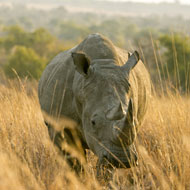Born Free criticises new film on trophy hunting

Born Free warns that legalising the rhino horn trade could be a recipe for disaster.
International wildlife charity the Born Free Foundation has criticised the new film Trophy, which explores the relationship between big-game hunting and conservation.
Due for UK cinema release tomorrow (17 November), the film promises to ‘explore the complex heart of contemporary issues of animal conservation and commodification at a time when endangered African species such as elephants, rhinos and lions march ever closer to extinction’.
Film-makers Shaul Schwartz and Christina Clusiau, meet breeders and hunters at the world’s largest hunting convention in Las Vegas. A common mantra of these businesses, according to the Trophy website, is that ‘if it pays, it stays’, which is a reference to the controversial notion that if monetary value is assigned to an animal, it will be considered ‘worth protecting’.
‘Canned’ trophy hunting, which allows big game to be legally hunted in a confined area, is legal in South Africa. Wild animals, particularly lions, are bred in captivity and opportunities to hunt them are auctioned off for huge sums.
Trophy also features the world’s largest private rhino breeder, John Hume, who believes that legalising the trade in rhino horn is the only way to protect the species. Mr Hume has nearly 1,500 rhino and trims their horns every two years. He has invested $50 million into the project and has stockpiled over five tonnes of horn. While this practice is prohibited internationally, it is legal in South Africa.
However, Born Free warns that legalising the rhino horn trade could be a recipe for disaster. In 2008 the international community approved a one-off sale of over 100 tonnes of ivory from South Africa and several other countries to Japan and China, in a bid to satisfy consumer demand. But Born Free says it fuelled an explosion in poaching and illegal trade.
From 2009-2014, Tanzania lost an average of 1,000 African elephants a month for five years, equating to 60,000 elephants. The charity is warning that Mr Hume’s proposition is likely to have the same impact, as creating a legal trade could open up new opportunities for the illegal trade to prosper.
Born Free’s president Will Travers said: “I believe this film will be used by the South African government to push for legalisation of rhino horn at Cites, the global wildlife trade conference to be held in Sri Lanka in 2019. If that proposal is approved then I predict an apocalyptic future for rhino and poaching rates we can only imagine.”
Trophy will be released in the UK on 17 November.



 The Veterinary Medicines Directorate (VMD) is inviting applications from veterinary students to attend a one-week extramural studies (EMS) placement in July 2026.
The Veterinary Medicines Directorate (VMD) is inviting applications from veterinary students to attend a one-week extramural studies (EMS) placement in July 2026.